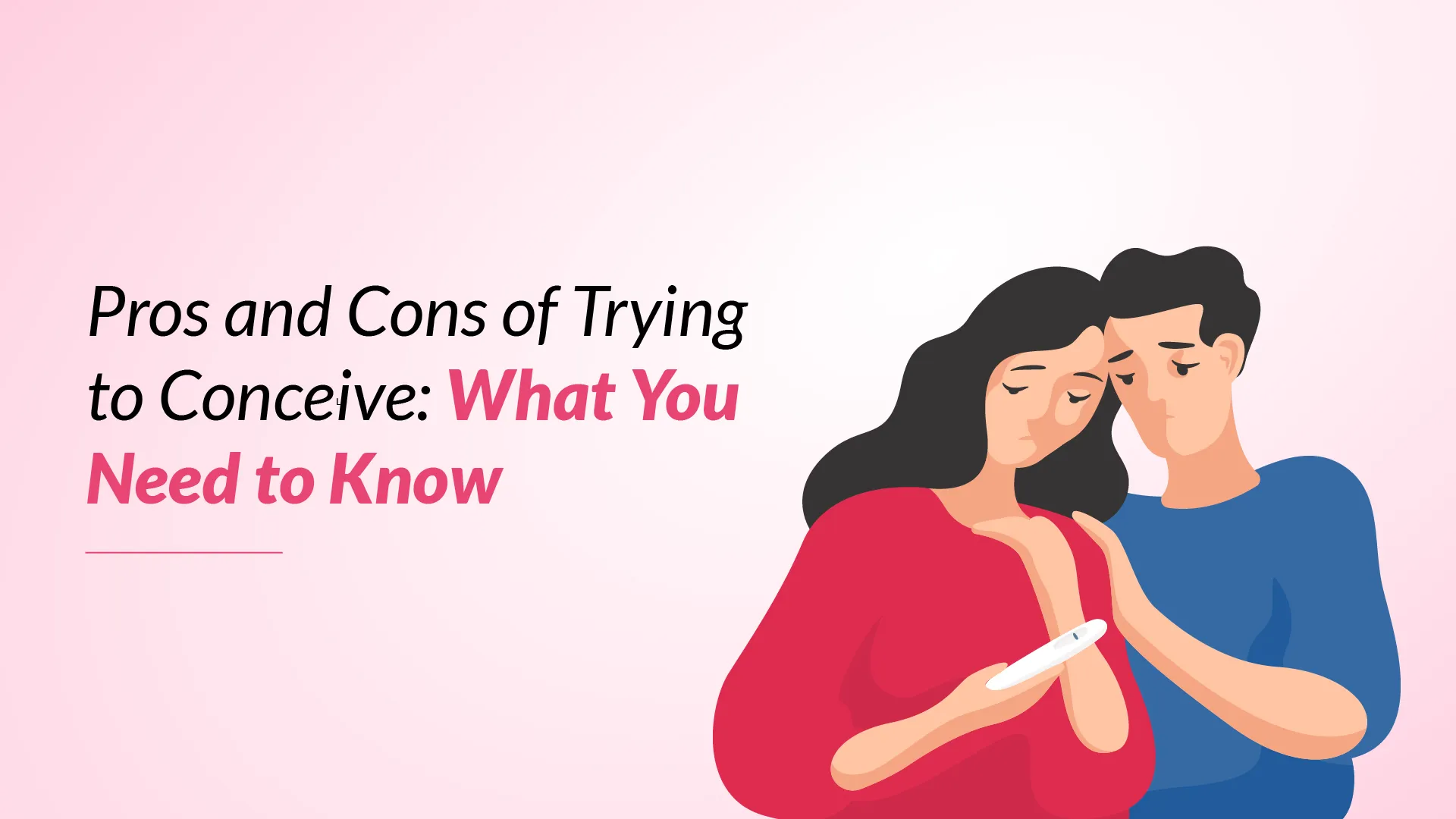Reviewed By: Dr. Spoorthy Chennamaneni, fertility specialist at Ferty9 Fertility Clinic, Kukatpally, Hyderabad
The decision to start trying for a baby marks one of life’s most significant milestones. While many couples begin their trying to conceive journey with excitement and optimism, the path to parenthood often involves careful planning and consideration.
This comprehensive blog explores the advantages & disadvantages of actively trying to conceive, providing essential information to help individuals & couples make informed decisions about their reproductive journey. From timing considerations to practical tips, readers will learn what to expect when embarking on this crucial life stage.
Also read: Useful Trying To Conceive Tips from Expert
What Does “Trying to Conceive” Mean?
“Trying to conceive” (TTC) represents a deliberate journey towards pregnancy through regular unprotected intercourse. While many couples might think it involves complex tracking methods, the clinical definition is surprisingly straightforward.
From a medical perspective, TTC means having unprotected intercourse without preventing pregnancy. However, successful conception often involves understanding several key components:
- Timing intercourse around ovulation (typically 12-16 days before menstruation)
- Maintaining regular intimate relations every 2-3 days
- Adopting healthy lifestyle changes
- Monitoring fertility signs
- Understanding conception timeframes
For couples under 40 having regular unprotected intercourse, there’s an 80% chance of achieving pregnancy within one year. This journey becomes more time-sensitive for women over 35, who should seek professional guidance after six months of trying.
The process of trying to conceive goes beyond just the physical act. It involves preparing both body and mind for pregnancy. Early in the TTC journey, healthy lifestyle changes can significantly impact fertility and future pregnancy health. These changes include taking folic acid supplements, maintaining a healthy weight, avoiding alcohol & stopping smoking.
The Pros of Trying to Conceive
Actively planning for pregnancy brings numerous advantages that extend beyond just conception.
Emotional Satisfaction
The journey of trying to conceive often creates a deep sense of purpose and anticipation. Couples who actively plan for pregnancy report feeling more emotionally prepared for parenthood. This intentional approach allows them to process their feelings and build excitement about their future family.
Improved Relationship Dynamics
Planning for pregnancy can strengthen relationship bonds significantly. Couples experience enhanced communication and intimacy as they work towards their shared goal. Research shows that partners in committed relationships often feel more connected when actively trying to conceive, as it encourages open discussions about future plans and shared responsibilities.
Awareness of Health and Lifestyle
Trying to conceive motivates couples to make positive lifestyle changes. This increased health consciousness brings multiple benefits:
- Improved nutrition through balanced diet choices
- Regular exercise and maintaining a healthy weight
- Reduced alcohol consumption
- Better sleep habits
- Enhanced awareness of reproductive health
Sense of Control and Empowerment
Knowledge about fertility empowers couples to make informed decisions. Understanding ovulation patterns and fertile windows gives them a sense of control over their reproductive journey. This awareness helps couples feel more confident about their choices and timing.
The Best Time to Get Pregnant
Understanding the optimal time for conception increases success rates significantly. The fertile window typically occurs fourteen days before menstruation, with pregnancy possible up to 5 days before ovulation and 1 day after. This knowledge helps couples time their efforts effectively, reducing stress and increasing chances of success.
The Cons of Trying to Conceive
While trying to conceive brings hope for many couples, the journey can present significant challenges. Understanding these potential difficulties helps couples prepare mentally and emotionally for the path ahead.
Emotional Strain and Stress
The process of trying to get pregnant can create considerable emotional pressure. Research indicates that individuals experiencing fertility challenges often report stress levels comparable to those diagnosed with severe health conditions. This stress can manifest through:
- Anxiety about timing
- Depression, when faced with negative results
- Feelings of inadequacy or guilt
- Physical symptoms from stress
Financial Considerations
The financial impact of fertility treatments can be substantial. A basic IVF cycle typically costs around ₹1,50,000 to ₹2,50,000, with additional expenses for medications and monitoring. Insurance often doesn’t cover these costs, creating further stress for couples.
Impact on Relationships
The structured nature of timed intercourse can strain intimate relationships. Couples often report that the military-like schedule of conception attempts can reduce spontaneity and create tension in their partnership.
Unrealistic Expectations
Many couples enter the conception journey expecting quick results, but only 20% of couples conceive each month, even at peak fertility. This gap between expectation & reality can lead to disappointment and frustration.
When Can You Get Pregnant?
Understanding the precise timing for conception can be challenging. The fertile window occurs approximately 14 days before menstruation, with only a 5-6 day period each month when conception is possible.
Tips for Successful Conception
Success in conception often depends on understanding the intricate timing of fertility and implementing proven strategies. Couples who approach this journey with knowledge and preparation typically experience better outcomes.
Best Time to Conceive: Timing and Ovulation
The optimal time for conception occurs during the fertile window, which spans five days before ovulation and one day after. Women typically ovulate around 14 days before their next period starts. Clear, slippery cervical mucus indicates approaching ovulation and represents the best time for intercourse.
How to Increase Chances of Getting Pregnant
A systematic approach to conception involves:
- Having regular intercourse every 2-3 days throughout the cycle
- Maintaining a healthy body weight
- Taking folic acid supplements daily
- Avoiding alcohol and smoking
- Tracking basal body temperature
- Using ovulation predictor kits
How to Get Pregnant Fast
Couples can maximise their chances by timing intercourse during the three days leading up to and including ovulation. Using ovulation prediction kits helps identify this crucial period. Moderate exercise and stress management also play vital roles in supporting fertility.
Trying to Conceive Tips
Successful conception often requires patience and consistency. Couples should focus on creating a healthy environment for pregnancy through proper nutrition and lifestyle choices. Regular preconception checkups ensure both partners are in optimal health for conception.
When to Seek Doctor Help
The timeline for seeking professional help varies primarily based on age and health factors. Here are the general guidelines for when couples should consult a fertility specialist:
- Under 35 years: After one year of regular unprotected intercourse
- Between 35-40 years: After six months of trying
- Over 40 years: Immediate consultation recommended
- Any age with known medical conditions: Seek help immediately
Certain conditions warrant earlier medical consultation, regardless of age or trying duration. These include irregular or absent menstrual cycles, known fertility problems, endometriosis, or a history of pelvic inflammatory disease. For those who have experienced two or more miscarriages, immediate medical evaluation is recommended.
Male partners should also consider early consultation if they experience difficulties with erection or ejaculation, have had previous surgeries in the pelvic area, or notice any testicular abnormalities. Up to one-third of fertility challenges involve male factors, making it essential for both partners to seek evaluation when needed.
Find Hope and Solutions for Female Infertility and Male Infertility — Explore Our Comprehensive Services
IVF Treatment
IUI Treatment
ICSI Treatment
PICSI Treatment
Fertility Preservation Service
Blastocyst Culture & Transfer Treatment
Genetic Screening & Testing
Conclusion
Starting a family through normal conception represents an exciting and complex milestone. While couples face various challenges like emotional stress, timing pressures, and potential financial strain, the rewards of planned parenthood often outweigh these difficulties.
Success in conception comes from understanding fertility windows, maintaining healthy lifestyle habits & knowing when to seek professional help. Most couples achieve pregnancy within a year of trying, though age and health factors can affect this timeline. Regular communication between partners, consistent health practices, and realistic expectations create the best foundation for this life-changing journey.





























